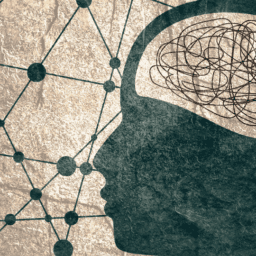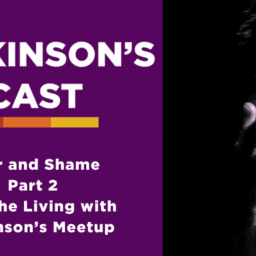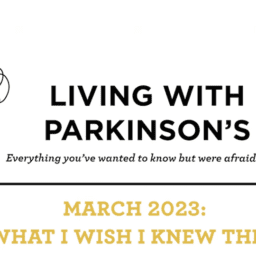Parkinson’s disease psychosis can be a scary topic to address. Between 20-40% of people with Parkinson’s experience Parkinson’s disease-related psychosis and the hallucinations that come with it. These hallucinations come with their own symptoms that can exacerbate the already existing motor symptoms of Parkinson’s. In our most recent webinar, we learned about hallucinations, illusions, and delusions from Dr. Dylan Wint. You can watch the webinar below, and make sure to join us on October 28 when we do a Q & A with Dr. Cherian Karunapuzha on this topic. Have a question about PDP? Please complete the form here and let us know.
You can read the transcript below or you can download it here.
Note: This is not a flawless word-for-word transcript, but it’s close.
Melani Dizon (Director of Education, Davis Phinney Foundation):
Welcome everybody to the Davis Phinney Foundation’s Live Well Today webinar series. My name is Melani Dizon. I’m the Director of education at the Davis Phinney Foundation, and I’m really excited to be here today with Dr. Dylan Wint. Went to talk about Parkinson’s disease psychosis. Dr. Went, I know you’re currently the director of the Cleveland Clinic, Lou Roe Center for Brain Health, but I would love for it if you could tell us a little bit about how you got interested in this field of work, working with people with Parkinson’s, and then specifically your work related to Parkinson’s disease psychosis.
Dylan Wint, MD (Director, Cleveland Clinic Lou Ruvo Center for Brain Health):
Sure. first of all, thanks for having me, and thanks to all of you for attending. We’re going way back now if I’m trying to think about how I got interested in Parkinson’s disease and psychosis, but I think it was when I was in residency and recognized the broad range of symptoms and problems that Parkinson’s disease can cause. And I trained as both a neurologist and psychiatrist. And so, Parkinson’s disease is an area where the two of those fields sort of intersect almost seamlessly. Most people with Parkinson’s disease, which is a neurological movement disorder, will have some type of behavioral or mood disturbance that we usually classify as psychiatric conditions. And so, the neuropsychiatric nature of Parkinson’s disease itself kind of attracted me to the field. And in psychiatry, what really drew me into psychiatry was the symptoms of psychosis.
So, hallucinations, delusions, and disorganized thinking were really very fascinating to me as a medical entity, but also one of the areas where I felt that we could see somebody who is suffering immensely from these symptoms and really make a very big difference in their quality of life. Because most of the time when someone enters a psychiatric hospital with delusions, hallucinations it’s because those delusions and hallucinations have overwhelmed them where they’re not functioning because these symptoms are interfering so much with their thinking, their actions, and usually by the time they leave the hospital, we have at least reduced the intensity of the delusions and hallucinations to the point where their function is much better. So, it also seemed like an area where there’s a lot of, quote unquote bang for the buck in terms of how much you can do to help someone’s quality of life and reduce their suffering.
Melani Dizon:
Yeah. Oh, that’s great. Okay. So, I’d love to we’re going to have this recording, so I know that they’re going to be a lot of people who have experienced Parkinson’s disease psychosis, well, that are watching this, and then others who have not others who are unsure. And so, I would love to kind of just level set and say you know, what is a specific definition of what Parkinson’s disease psychosis is, what it is not, what causes it, and then maybe some of the key aspects of it that people misunderstand. So, let’s start with Parkinson’s disease psychosis. You talked about hallucinations and delusions, but for those people who are very new, who have heard about it, but are really unsure, what is it?
Dylan Wint:
Sure. So, Parkinson’s disease psychosis talks about when people begin to experience there’s this broad-term disconnection from reality, and I don’t really like that. I prefer to be more specific. So, it’s when people begin to experience hallucinations and delusions. Hallucinations are sensory experiences that are generated by the mind, and there isn’t a correlation in real space. So, this would be, for example, seeing something that actually is not there. We would call that a visual hallucination. Hallucinations can occur in any sensory category. So, I mentioned visuals. We can have auditory hallucinations, which consist of hearing things that aren’t actually in the world, making noise. Old factory hallucinations, which are smelling things that aren’t there, Gustatory hallucinations, tasting something that’s not actually there. And tactile hallucination. So, feeling something on the skin that’s not actually present. We can also experience illusions, which are misinterpretations of real-life sensory stimuli.
So, for example, looking at a cactus and believing that it appears to be a person would be an illusion. There is a real object there. So, it’s not completely generated by the mind, but the mind is misinterpreting that input as being a person as opposed to a plant. Hallucinations in Parkinson’s disease tend to be most commonly visual, although they can occur in any of these sensory domains. Usually, when there is a hallucination, there’s a visual component to it, although not always, but visuals are most characteristic. We also can characterize hallucinations by how detailed they are. So, we can call hallucinations vague. Seeing a gray cloud in front of you might be a vague hallucination versus well-formed seeing a person or a cat or a tree that’s not there would be a well-formed hallucination, and we can call them complex versus simple.
So, seeing a tree is a simple hallucination. Seeing a forest with animals running in, it is a complex hallucination. Seeing a person sitting in a chair is simple. Seeing multiple people conversing would be a complex hallucination. Delusions on the other hand are beliefs that are not supported by evidence in the real world. So, we used to call them fixed false beliefs, but I think it’s better to say beliefs that are not supported by evidence that’s readily available to the person. And delusions also have several types based on the way that we as human beings think. So, common delusions in Parkinson’s disease include delusions of infidelity that the person’s romantic partner is seeing someone else cheating on them. Delusions of paranoia. Those are thoughts of distrust or suspicion or that someone is targeting or watching you with the intent of doing harm.
Persecutory delusions, meaning that someone is harming you. The belief that someone is harming you and delusions of misidentification. So, this is when a person or an object has been replaced with an imposter. Some examples, one is called a Capra delusion, and that is when someone believes that there is an imposter of someone close to them, you know, you look just like my son, but you’re not really my son. You’re someone else either inhabiting his body or someone else pretending to be him or maybe not even pretending to be him, just some other nice person who’s there. Looks a lot like him, but although he says he is, he’s not really that person. There can also be delusional misidentification for objects or locations believing that the house that you are currently in, although it looks a lot like your house, even has objects that are familiar to you.
It’s not exactly right. And so, this is not your house. Your house is actually next door or somewhere else, and there’s been some kind of trick that’s being played. So there, there’s a variety of manifestations of both hallucinations and delusions in the same way that there’s a variety of brains, right? None of our brains are identical to a brain that’s ever been here before or ever will be again. And so, as you can imagine, a condition that says mysterious and as widespread in the brain as Parkinson’s disease can produce many, many different manifestations of what we sort of lump into Parkinson’s disease psychosis.
Melani Dizon:
Right. Okay. So, I want to go in-depth into each of those hallucinations, allusions, and delusions. But before we do that, a little bit of context around is there something that causes it. Is it some, there are some things that make people at greater risk for developing purpose psychosis? Is it med always medication related? What are, what are, what are some things that people need to look out for?
Dylan Wint:
Yeah, that’s a great question. And the answer is we don’t quite know. There are relationships between psychosis and Parkinson’s disease and some brain chemicals, most prominently dopamine, acetyl co serotonin, and glutamate. These are all neurotransmitters that are involved in how we think about the world and how we experience the world. The relationship with dopamine is probably the first one that was recognized because number one, Parkinson’s disease causes the degeneration of dopamine circuits in the brain. And sometimes hallucinations and delusions can be precipitated by giving someone medicine that increases the amount of dopamine transmission. So overdosing or heavy dopamine transmission can help to bring about hallucinations and delusions. But note that even before we had any Parkinson’s medications, we saw that people were having hallucinations and delusions with Parkinson’s disease, the medicines that are most likely to increase hallucinations or delusions are dopamine agonists.
So those are medicines that are used to control the movement symptoms. Ropinirole is one of those probably the most commonly used one is ropinirole. Pramipexole is another one that’s very commonly used. So, they directly stimulate dopamine receptors and seem to be the most associated with hallucinations and delusions. Medicines that block acetylcholine. So, anticholinergics are also associated with a higher risk of hallucinations and delusions. So, you had asked about, oh, other risk factors. Age is a risk factor. So, the older you are, the more likely you are to experience Parkinson’s disease, psychosis symptoms mood, and cognitive disorders also predisposed towards Parkinson’s psychosis symptoms and duration of illness, how long you’ve had Parkinson’s disease tends to increase the risk. All of these are associated with higher levels of brain dysfunction and degeneration. So long you’ve had Parkinson’s. The more changes there are in the brain if you have a cognitive problem or a mood problem, it suggests that something is not operating quite correctly somewhere in the brain.
Melani Dizon:
So, you’re saying it’s maybe somebody had a history of depression, you know, well before Parkinson’s? Those are just, that’s just another risk
Dylan Wint:
Factor? Yes. There’s, there’s a that, that risk is smaller though than the risk of having a current episode of depression and increasing the risk for Parkinson’s disease dementia. Okay. We can also see, or Parkinson’s disease psychosis, excuse me. We can also see psychosis symptoms when people become delirious, meaning that there’s some other illness in the body, an infection a metabolic problem, too little salt, too much salt where there is a problem elsewhere in the body, but it impacts the brain and causes more problems with brain function. That’s why some of the most important ways to reduce the risk of Parkinson’s disease psychosis have to do with making sure that your physical health is as good as it can be, and that you check into any potential risks to that physical health. Again, that includes minimizing doses of medication, you know, not using medications more than you need to, not using medications that you don’t have to be on. Making sure that if, for example, someone has a tendency tends to be prone to urinary tract infections or other types of infections that we watch out for those and that we avoid getting sick with things like covid, the flu, and so forth while delirium, we think of as a temporary condition. So once the medical illness is over, the delirium should go away. We do sometimes see that brain dysfunction persists even after the medical condition is eliminated.
Melani Dizon:
Okay. I know one of the questions that I get frequently is how many people with Parkinson’s end up experiencing some level of Parkinson’s disease psychosis. Is there, you know, I’ve seen everything from 50% to 60%, and there’s a spectrum, right? You, you know hey, I had one hallucination, and it was just very simple versus somebody who’s having them all the time. But is there any data or research around percentages? I know that’s just something people care about.
Dylan Wint:
So having a hallucination, or a hallucination or two is pretty common. And probably 50% or more people with Parkinson’s disease will experience hallucinations or even several hallucinations. But in terms of being in a state of psychosis, meaning that hallucinations are frequent, that even between individual hallucinations, there’s not quite the level of insight or the level of understanding, or that there’s a persistent delusion in between hallucinations. We see that in about 15 to 30% of people with Parkinson’s disease. And again, it depends a lot on those risk factors. In particular, the biggest one is how long you have had Parkinson’s disease. The longer you’ve had Parkinson’s disease, the more likely you are to experience Parkinson’s disease psychosis.
Melani Dizon:
Okay. So, let’s go down the path of hallucinations. You just said something that I think is important for us, for you to explain. First of all, can you talk about what the difference is between having insight and not having insight with when you have a hallucination?
Dylan Wint:
Yes, absolutely. So, having insight into a hallucination means that you recognize it as not being real. So that can be in the moment as it’s happening, in which case we would call it full insight, or it can be retrospective where the person reacts to the hallucination as if it were real. But on looking back, and some of you who are caregivers or even patients might know that a lot of times in the doctor’s office when we’re talking about these things, it’s pretty easy to recognize them as not being real. But when it’s right in front of you we react as if it’s real. And that’s really because human beings are incredibly dependent on our visual system. And it’s very hard for us to deny something that our visual system tells us is actually there. And as I mentioned, most of the hallucinations in Parkinson’s disease are occurring in the visual system. So, insight is how, where you are of the fact that this is a trick that your brain is playing on you, and the degree to which you resist the impulse to act upon that hallucination. And it’s similar with delusions, the recognition of something as being actually not real, which is really rare with delusions because delusions are fixed beliefs. But sometimes people will have retrospective or retroactive insight. Wow, I really believed that. And that, that was strange. And I’m glad I don’t think that anymore.
Melani Dizon:
Right. Okay. Yeah, that’s interesting. Cause I have, I have heard people talk about, you know, their, I’m, I’m telling me a story. I saw this along the baseboard, and I knew it wasn’t right, and I was just watching it being like, wow, what is, what is happening? What is my brain doing? I know that can’t be right. But typically, with a delusion where, you know, I know my spouse is cheating on me, they’re, they’re looking back on it, but not in that moment there, like, they’re not going to leave that thought in that, in that moment. So, we’re going to talk a little bit about what to do when that happens for sure. In a little bit. But somebody with insight, like I said, they could be seeing, hey, I see these people dancing along the baseboard of my room.
Melani Dizon:
I know it’s not real. And you know what? It just eventually goes away. And then they say, Okay, wow, that, well, that’s over with now. Or they see it and they’re really feeling it in that moment, and they don’t have insight, and maybe they’re talking, and their care partner is, you know, coming in. What do you, what’s going on? And they, they’re describing it to them. What are some things that people can do, whether a care partner or friend or somebody who’s experiencing that with somebody, what do you recommend they do in those situations?
Dylan Wint:
Well, I think it’s important to recognize that for the person experiencing it, the hallucination or delusion is real. It is the truth. It’s the truth that their eyes are telling them, or the truth that their brain is telling them. They are reacting to what they see the same way we react to what we aren’t seeing. And so, it’s fair to disagree in these terms, saying something like, I don’t see them, or I understand that you think that, but I have to be really clear with you that I’m not cheating on you. A lot depends on how these statements are made. I often say that feelings are more important than facts in degenerative disorders of all kinds. And at least establishing or reinforcing the fact that you as the care partner are safe. That you care about what the person is feeling, what they’re experiencing, that you recognize that what they’re experiencing is troubling or frightening to them and that you are there to support them not to deny the existence, although you can, you know, bring up, I think this might be what Dr. Wint was talking about in the office the other day, that sometimes your brain will play tricks on you. You remember that. But to insist that someone is not experiencing what they tell you that they’re experiencing is really not going to turn out well because we all experience what we experience.
Melani Dizon:
And some, they’re already agitated,
Dylan Wint:
Right. And a state, of mistrust, right? Maybe not necessarily mistrust toward the individual in front of them, but mistrust about the whole world, right? Right. Here is something happening in front of my eyes that from everything I know, I’ve been told not to expect to happen in front of my eyes. And yet it is. And it sort of opens up this possibility that anything could be true, or that anything you say to them could be false. But if you try and retain the feeling that I’m a safe person, I’m someone you can talk to, I’m someone that you can tell me when you’re having these experiences, and I’m not going to poo poo them or make you feel small or stupid about it. Those, that’s, those are probably the most important tactics. Now in terms of things that we can do that are more you know, factual or practical, sometimes hallucinations or illusions can be minimized by increasing the amount of real stimulation. So that means in a somewhat dark room, people may be more likely to see things that are not there or misinterpret what they see. So, if you can increase the amount of true stimulation, that may help make sure that an individual is getting the rest that they need making sure that when they are not resting, that they’re engaged in some activity that can occupy their sensory systems and their brains so that they’re not preoccupied with these false experiences can be very important as well.
Melani Dizon:
Yeah. Somebody once said you know, shadows can, you know, do things in the room. Absolutely. So, turn on the light, you know, if somebody’s starting to feel it, turn on the light and that might change what their visual field is. Right. For sure. As somebody says, my mom thinks that people on TV can see her and are in dating her privacy, I think that’s, that’s
Dylan Wint:
That’s what we would consider that a paranoid delusion. Sometimes it’s helpful sometimes to break that down a little bit. Well, people on which shows, and you know, if you can avoid those, sometimes it really is tied to the type of material that someone is looking at. And if you can change it to something else that helps sometimes finding out, well, what is the concern that that, what is the underlying concern? Is it these, is it just so that people can see you or that they can see you and as a result of being able to see you, they can come after you and harm you? Is that the concern? Because if it’s something that is threatening, then like anyone else we might start thinking about how we’re going to defend ourselves and even do things that might be unwise, in sort of defending ourselves. If it’s just a sense, a feeling, what if they could see me through the tv? It may not require a lot of intervention other than checking in every now and then to see if that feeling has escalated into a fear that they’re watching you through the tv.
Melani Dizon:
Right, right. So, as you know, some people will ask, how do I know that this has, that whatever it is, the delusion of the hallucination is, has reached the level where I need to get immediate help? And that this is, doesn’t really feel like something that’s going to go away, or I’m worried that I don’t have what I’m equipped to, to take care of this person. What do they do? What are some signs?
Dylan Wint:
Yeah. So immediate help, I think that when the person feels acutely threatened, not you know, sometimes there will be a statement that indicates that they are worried about coming to imminent harm, that something’s about to happen to them. And again, there may be enough fear there that they’ll want to defend themselves. And you definitely, even if they haven’t actually picked up an object or threatened you specifically it’s certainly something simply because of the level of discomfort that that indicates that a medical provider should know about. Right. So, if somebody actually feels threatened, think about how you feel when you feel threatened. And even if you are not planning to harm somebody, you sure would like that threatened feeling to go away. And so, I, you know, there’s sometimes talk of, well, if the person actually tries to harm you or tries to harm themselves, that’s when you should seek help.
And I think that’s kind of obvious. People know that, but I think it’s that sense of being under threat that we really should work on one, because we can probably talk to someone more when there’s a general sense of being under threat than we can, once they’ve started to respond to a threat, right. At that point, then it’s about controlling the behavior, and we want to really try and help them through it. And because when people are threatened, you can become, they can become less predictable. So, an acute threat or even sort of a chronic threat it’s not easy to say for sure when someone may respond to that or see something else that’s, that’s threatening and makes them feel very scared or terrified.
Melani Dizon:
Right. And so, you know, what’s available to people is to say, hey, we’re going to have to call an ambulance. We’re, we’re, after I’ve run out of my things in my toolbox and it’s not working and it’s the middle of the night, let’s say, or something like that. What do, what do you recommend people do? Like
Dylan Wint:
Yeah, and it, this depends a lot on what your situation is. So, our clinic, for example, we’re sort of a seven thirty to five thirty kind of clinic. It wouldn’t be useful for me to tell people, oh, give us a call if there’s a problem at 8:00 PM so yeah, sometimes it is an emergency room or an urgent care. that will, you’ll need to get them involved. Sometimes if it’s at night you can try and encourage the person to go to sleep, ensure that they feel safe again, and increase the amount of sensory stimulation. It’s difficult to sort of giving advice for every scenario, but acute threats or the sense of acute threat can be dangerous. a sense of chronic threat that someone’s out there. And at some point they, I think that they’re going to do something to me. Usually, you can try and talk that through and set up for an appointment to. see what can be done to help.
Melani Dizon:
Great. one of the things, and I want to talk a little bit about some other misunderstandings. Actually, let’s go back to the hallucinations to wrap that up. You talked about simple and complex. Is there is, you know, is it, well, you usually get simple ones when it’s your first hallucination, and then they get more progressive as you get worse in your disease. Is it a sign of advanced Parkinson’s? I know that’s a question we get often. How does that work?
Dylan Wint:
Let me start with the second part first. So, we can see hallucinations in individuals who don’t have very advanced motor symptoms of Parkinson’s disease. So having hallucinations does not necessarily track with how severe the motor symptoms are. There’s more of a general loose relationship between those two. Most folks will have at least a moderate level of motor impairment when hallucinations start, but that’s not an ironclad rule. Sorry. And then, I went ahead and forgot the first part
Melani Dizon:
Of the question. Oh, did the difference between simple and complex?
Dylan Wint:
Right, right. So, in general, hallucinations do start off simpler and become more complex over time. But I had a, I saw a patient maybe a couple of months ago who thus far as had one hallucination, but that one hallucination was of a musical festival with bonfires and stuff like that in her backyard, in the middle of the night, incredibly complex and rich hallucination. And as far as we know, the first one that she’d ever had. So, the no rule is ironclad with Parkinson’s disease. But in general, yes, you do tend to go from simple to complex, almost as if the brain is kind of learning how to hallucinate better and better.
Melani Dizon:
And do you go, do you typically go from insight to no insight as well on.
Dylan Wint:
That also tends to be the case. That insight tends to be lost with progression.
Melani Dizon:
Okay. What about, and this one I’d like to talk about some of the things that people misunderstand about Parkinson’s disease, psychosis. other hallucinations, delusions. And is there anything tied to sleep, because that’s what we get a lot from people that are, is it, is it, you know, REM sleep behavior disorder? Is it a hallucination? What, are those tied at all?
Dylan Wint:
That’s a really good question. So, there’s some evidence that, but it is fairly weak evidence that people who start to have very vivid dreams may tend to have hallucinations soon following. But that is really based more on retrospective evidence that people who are having hallucinations get asked, well, were you having vivid dreams six months ago?. and the tendency will be to reply. Yes. the, I would say that the relationship between, let’s say REM behavior disorder and hallucinations may be one, hallucinations and delusions may be one of a violation of sleep weight boundaries that with a REM behavior disorder, we’re doing something while we’re asleep and dreaming, which is moving about. That really should only happen while we’re awake. And perhaps with, particularly with hallucinations, particularly complex hallucinations, perhaps we’re doing something while we’re awake, seeing things that aren’t there, feeling things that aren’t there that really should only happen while we’re asleep. This is highly, sort of theoretical. There clearly is a relationship between REM behavior disorder and visual hallucinations, but I think that’s simply because both of them are sort of representative of the presence of synuclein, which is what invades the brain with Parkinson’s disease.
Melani Dizon:
Right. Okay. And are there anything, is there anything else that people often misunderstand about psychosis?
Dylan Wint:
Well, I think that a lot of times people will tend to believe that because they’ve had a psychotic symptom, or even if they’ve had several, that that necessarily means that they are, you know, crazy or losing it, or even that they are, they’re going to experience imminent cognitive decline in, in addition to hallucinations and delusions. A lot of this comes from, you know, the fact that there are some conditions where hallucinations and delusions are part and parcel of an overall set of symptoms that represents worsening contact with reality, worsening ability to function in day-to-day life conditions such as schizophrenia and bipolar disorder, where hallucinations and delusions are part of an overall complex. And, you know, unfortunately, whether it’s in the media or even from medical professionals’ sort of conflating psychosis with those disorders makes us think about those disorders whenever we hear that someone is having psychosis symptoms.
So, I think maybe the primary thing is that with Parkinson’s disease psychosis doesn’t mean that you’re getting a new condition, an additional condition. It means that you have a new symptom of Parkinson’s disease, the same way that you might develop trouble with your balance that you didn’t have last year with Parkinson’s disease. And as they are symptoms of Parkinson’s disease, that means your neurologist would need to know about them. So that’s another area that often gets overlooked, is that because they are, quote-unquote psychiatric symptoms, people don’t think to ask their neurologist about it. And neurologists at this point, I think are pretty familiar with what can be done to reduce the intensity of hallucinations and delusions in, in Parkinson’s disease. Whereas you may spend a long time trying to find a psychiatrist who, you know, is fully on board and fully aware of what needs to be done to take care of.
Melani Dizon:
Okay. Yeah, that’s fairly helpful. So, we talked a little bit about some of the drugs that may or may not put somebody at greater risk for a developing psychosis. What are some pharmacological and non-pharmacological things that people can do? You know, we talked about turning on the lights to just sort of mitigating the possibility for visual stimuli to you know, rise to the level of hallucinations and stuff like that. But are there pharmacological treatments for people that experience it non-pharmacological? And then does it often happen, let’s say somebody finds, oh wow, I, well, I changed this medicine and I’m seeming to have more psychosis, I get off of it and then they never have them again. Is, does that happen too?
Dylan Wint:
That can happen. Yeah. There, you know, in the same way, that I can take a medicine that makes me really sleepy, and I stop taking and it doesn’t make me sleepy, these are both examples of brain dysfunction. Sleepiness with medicine is something to which like almost everyone is predisposed, right? That can happen to anyone on any medicine. Hallucinations with a medicine are something that people who have Parkinson’s disease are particularly predisposed toward, although I’m sure there are lots of individuals out there who don’t have Parkinson’s disease. You know, they’re not going to be the majority of the population, but there’s probably one or 2% of people with no Parkinson’s disease where their adverse reaction to a hallucination or to a medication will be a hallucination. So really think about it in those terms that there are contributors to the risk, and that can include the medication as well as the brain in which the medication is being dos.
So, the first thing that we usually do when we think about pharmacologic management for hallucinations and delusions is taking a good look at the current medicines, particularly what has changed recently and particularly, what are the highest-risk medicines for hallucinations and delusions. A consideration might be, for example, if someone is taking a dopamine agonist, such as ropinirole or pramipexole, could that be replaced with levodopa? And for some people, the answer is no, it can’t be, otherwise, they’ll be frozen. Or have we tried it before? In some people, you can make that replacement and it will help. So that’s the first thing is offending medications. The second thing is any offending conditions or conditions that might make it worse and managing those dehydration, infection, and depression targeting those for treatment. And then you can give medicines that are intended to reduce the delusions in hallucinations.
So, there’s one called pimavanserin that is specifically was specifically developed for hallucinations and delusions in Parkinson’s disease. There’s also clozapine, which has been out for a very long time, and it was developed for schizophrenia, but it’s also quite effective for hallucinations and delusions in Parkinson’s disease. There are other medicines in the antipsychotic family that either has less effectiveness or have less or aren’t, aren’t as safe for people with Parkinson’s disease because a lot of the medicines in the antipsychotic family lock dopamine and blocking dopamine can be very harmful in terms of motoric symptoms. A lot of them also block acetylcholine and acetylcholine-blocking drugs can make hallucinations and delusions, and also cognition and memory worse.
Melani Dizon:
Okay, great. So, this is a great time. If you have a question for Dr. Wyn about Parkinson’s disease psychosis, something that you’ve experienced somebody, something that your person with Parkinson’s has experienced a challenge as a care partner that you could use some help with, feels free to throw that in the chat. And we’ll, we’ll get to some of the as many questions as we can. Let’s see, what else do I want to talk about? What role I don’t know, I don’t even know how to ask this correctly, but I think a lot of times people think of it as dementia, you know, or something related to dementia, or this is going to turn into our dementia. How does that, how does that work?
Dylan Wint:
Yeah, so having dementia, Parkinson’s disease-related dementia is one of the risk factors that increases the likely, to the likelihood of hallucinations and delusions. And if someone does start to experience new hallucinations and delusions, it is helpful to do some kind of cognitive test or screening with them. One of the primary reasons, well, there are coup a few important reasons for doing that. One is if someone is developing a cognitive disturbance, then they’re going to need more support. They’re going to need support in the cognitive arena in the same way that they have previously needed support in the motor arena. The second is that some of the medicines that are used to slow down the loss of memory and the loss of cognition in Parkinson’s disease dementia are also effective at reducing particularly hallucinations and sometimes delusions in Parkinson’s disease psychosis. It’s also important if someone is developing cognitive dysfunction.
You know, when we talk about needing more support, that includes ensuring that when they come to the doctor that a care partner comes with them a lot of times for many years in Parkinson’s disease, and the person with Parkinson’s disease is going to the dock by themselves. But if cognition is starting to be disturbed there are two things that can become more complicated. One is the patient’s ability to report how they’re doing at home, particularly any new symptoms that develop. If you are struggling with your memory, you may not remember that. And then going the other way, what the provider suggests, recommends, or prescribes for the patient to do may also get lost if there’s a cognitive disorder. In fact, you may not even make it to your appointment if there’s a cognitive disorder. So that’s why if there are signs of cognitive change and development of hallucinations and illusions, it’s one of those, then a cognitive evaluation should definitely be performed. That said, a cognitive evaluation that comes back normal or the same as it was before you had hallucinations and delusions wouldn’t be shocking. You can, again, get hallucinations and delusions without the cognitive dysfunction.
Melani Dizon:
Right. this makes me think of this notion that I know that a lot of people are just very scared of this possibility. And so, you know, in, in your experience with everyone that you’ve seen with it what are some things that you can share with our community to sort of lessening that fear that says, you know, they’re not always scary. Sometimes they’re sort of benign and they’re just part of what they’re, you know, what they’re, what it means to have Parkinson’s and have the medication and that kind of thing. Because I don’t, I don’t want people to walk away from this with this like doom over their thing. Oh gosh, this is going to happen. And when it does it’s all over and that kind of thing.
Dylan Wint:
Most of the time hallucinations are benign. Delusions, maybe not be benign. Delusions do tend to be negative. You know, people don’t usually have grandiose delusions with Parkinson’s disease. We see it sometimes, but it’s not very common. They usually are negative, but they tend not to drive behavior as much as hallucinations and delusions do in say, schizophrenia or mood disorder with psychosis features. The second thing I guess to make clear is again, that this does not necessarily represent an overall change in the way that a person approaches the world or is able to manage what’s going on in the world. It’s not like when someone has schizophrenia, which as part of its definition means that you will have a declining occupational interpersonal function. That’s not necessarily the case with hallucinations and delusions in Parkinson’s disease. There are effective treatments that include environmental management includes activities management it includes pharmacological treatments, and it includes optimizing your current pharmacological regimen.
Dylan Wint:
So not I don’t want to sort of sugarcoating it, but at the same time, like you said, to be realistic, there’s treatment. Most of the time, this is not, most of the time people’s hallucinations are not frightening. Most of the time they are not persistent. Of course, there are people who have pretty severe cases, but for most people kind of in the middle of the bell curve, they are annoying but not frightening. They can cause some changes in behavior going and making tea for the person in the living room, but usually, they’re not going to be changes that are harmful or persistent. And for most people, there are effective ways of reducing or eliminating them.
Melani Dizon:
Great. Thanks. So, we have several questions coming in. How do you calm down a spouse who is convinced of your infidelity and accuses you daily? Yeah. This, that could be exhausting. When you have you know, a couple that comes in, and this is what’s going on, and the care partner is not knowing what to do, what do you recommend?
Dylan Wint:
You know, it that is one of the most difficult and actually kind of saddening situations that can occur with this. So, remember that it’s a fixed belief that fixed belief that’s not swayed by evidence. And so, providing the evidence that infidelity isn’t occurring, although it seems like absolutely the right thing to do, is unlikely to help, certainly is unlikely to help persistently reassuring the individual of how you feel about them and the fact that you wouldn’t do anything to like that to them. Reminding them if it’s possible that this is something that can happen because of Parkinson’s disease, that can help. But usually in situations like that, because marital or romantic relationships are so core and important to the quality of life I have a very sort of low threshold for applying pharmacologic treatments.
Melani Dizon:
Mm, that makes sense. So once this says anti-anxiety meds like clonazepam have a linkage to Parkinson’s disease psychosis.
Dylan Wint:
Yes. So, benzo diazepines clonazepam is part of that group. Can also increase the risk for Parkinson’s disease psychosis. I would say most people who take those, they don’t get a result in Parkinson’s disease psychosis. The important thing is going to be, well, they’re going to be two important things. One is the timing. If you see symptoms emerge soon after any change, that can be a change in what you’re having for dinner. The Parkinson’s disease brain is so sensitive to environmental changes that you really want to notice if there are correlations in time between when you’re seeing hallucinations and delusions start to occur versus when some habit or some medication or something else was changed. It can be even the environment, you know, after a move, someone can start to experience psychosis. Sometimes though we have to use those medicines to reduce the anxiety produced by psychosis for not able to reduce the hallucinations and delusions themselves so they can predispose, but we wouldn’t, I wouldn’t call them one of the sorts of high-risk medications for inducing this.
Melani Dizon:
Okay. so, he said, my mother had Parkinson’s and became delusional. I now have Parkinson’s myself. What are my odds of developing delusions?
Dylan Wint:
You know, that’s a good question. I can’t honestly say that I know the relationship between the relationship with a family history of Parkinson-related psychosis to the likelihood of developing it yourself. That’s something I should know though. I apologize for not knowing.
Melani Dizon:
Well, maybe
Dylan Wint:
I would know. I would say though, I would say though to remember what we talked about earlier, that even brains that are very closely related, even the brains of twins, twins’ brains are different from the time they emerge from the womb. They’ve already started, to differentiate. Okay. So, someone with an identical genetic makeup can have a different brain or will have a different brain. So, your parents’ history does not create your destiny.
Melani Dizon:
She said my mom was prescribed Seroquel to help her with sleep at night and control hallucinations. Is it true that higher doses of Seroquel make Parkinson’s motor control worse?
Dylan Wint:
So higher doses of Seroquel can cause problems with motor control, although theoretically, it should not. So, Seroquel is an antipsychotic medication. It was developed for use in schizophrenia and it’s since been found to be helpful in people with depression and with bipolar disorder. And because it works by blocking primarily serotonin it has been favored for use in Parkinson’s disease psychosis. The studies I think have not really born out strongly that Seroquel or Quetiapine is the generic name for it. is extremely effective in reducing Parkinson’s disease psychosis. The other thing that we see is that because of the sensitivity of individuals with Parkinson’s disease to any brain chemical change that sometimes we do see a worsening of motor symptoms with Seroquel. That may be because Seroquel, even though it primarily works through serotonin blocking serotonin, it does have a small amount of effect on blocking dopamine receptors. So that may be the issue, or it may be simply that in people with Parkinson’s disease, enough blockade of serotonin does also lead, to worsening of motor symptoms. But it, yes, it can happen that Seroquel will cause worsening of motor symptoms and it’s more likely to happen as doses increase. But it’s not a, it’s not a super common thing.
Melani Dizon:
Okay. So, she said the psychiatrist and neurologists work with my mom’s depression, anxiety, and Parkinson’s. Her neurologist doesn’t want to increase her sentiment because it will increase hallucinations. In the past, her hallucinations were controlled with Sinemet. Do higher doses of sentiment cause hallucinations
Dylan Wint:
Hallucinations were controlled with Sinemet?
Melani Dizon:
That’s what she said.
Dylan Wint:
That’s relatively, that’s unusual. Okay. So, Sinemet, of the motor medications Sinemet, seems to be the one that has, excuse me, the lowest potential for inducing or worsening hallucinations however it can do it also and you’re more likely to see it at higher doses. This is an unusual situation though, where it sounds like the psychiatrist wants to increase the sentiment and the neurologist is resisting that. Is that what I heard?
Melani Dizon:
Yeah. I think we might not, we don’t have the whole story, but it, the simple thing was the neurologist doesn’t want to increase the cinema because it will increase hallucinations
Dylan Wint:
With, I wouldn’t say it will, but it certainly
Melani Dizon:
Could. It could. Ok. So, it says, And
Dylan Wint:
So, this, I’m sorry, just one quick thing. Sure. But this goes back to what is the purpose of what we do in the doctor’s office. It’s to reduce as much suffering as we can if there’s a lot more suffering from motor symptoms. Furthermore, if she’s not having hallucinations now and there’s a lot of suffering from motor symptoms, it may be worth the risk or the burden to try and target those motor symptoms. Because what we’re trying to do is eliminate as much suffering as we can. Sometimes we have to balance one type of suffering against another, and it really is about what is causing the most dysfunction for the patient.
Melani Dizon:
Right. I definitely have had conversations with people who have said, who’ve opted for, well, I do have hallucinations. I have some insight. They’re not awful and terrible and I would rather have them than have all my motor symptoms. And so it is, it obviously is a pretty big balancing act and because so many medications are involved in this conversation and with hallucinations in Parkinson’s, it is so important to make sure that you’re, you know, constantly going back and saying what’s working, what’s not working, and working with your doctors to make sure that you’re on the right doses for the different things that you’re trying to get. I actually had this thought too. Somebody says, does long-term use of ambient for insomnia increase chances for hallucinations? I would say, I mean, irrespective of Parkinson’s, right? I mean, if the evidence has sort of been there that people without Parkinson’s is, are experiencing that
Dylan Wint:
Yes. Ambient cause ambient can cause hallucinations again. Yes. Like you said, even in people who don’t have Parkinson’s can cause nighttime behavioral disturbances so people can get up and walk around, eat, even drive on ambient when they are by as far as we can tell, asleep,
Melani Dizon:
Asleep. That’s terrifying. How do we get a very complete and thoughtful evaluation of dementia, hallucinations, and delusions? Which specialist is best equipped to evaluate and treat? And I know that’s a question that a lot of people are hard to have. Where do I go? Who do I see? What do I look up when I go to Google and say, I live in this town, and I need this?
Dylan Wint:
I wouldn’t think so much in terms of what the particular specialist is, but more in terms of the experience with Parkinson’s disease. And so, Parkinson’s Disease Centers of Excellence places that faith there are Parkinson’s Disease Centers more likely to have the experience to deal with it. So, you know, at my center, most of the folks who have Parkinson’s disease and psychosis, the movement disorders, doctors here take care of it themselves. I see a very small subset of those folks. So, you know, you could say, well, a psychiatrist knows what to do about delusions and hallucinations, but I’d actually trust one of my neurologists here over a lot of psychiatrists in terms of managing that. And similarly going the other way. So, I, you really want to look into the experience with Parkinson’s season. Sometimes just asking the person at the front office if they say I’m not sure. Move on
Melani Dizon:
Right. Good. Well, we are just about the top of the hour. Thank you to our sponsors Sunovion and Amneal and Kyowa Kirin for making this possible. And thank you Dr. Wint for being here today. We’re, we’re so grateful to have you.
Dylan Wint:
Thank you again for having me. It was a pleasure.
Melani Dizon:
Thank you. Thanks, everybody.
To download the webinar audio, click here.
Show Notes
What is Parkinson’s disease psychosis (PDP)?
Parkinson’s disease psychosis is when people experience hallucinations, illusions, and/or delusions. Hallucinations are sensory experiences that are generated by the mind. They can occur in any sensory category. For example, you can have visual hallucinations, where you see what isn’t there. Auditory hallucinations are when you hear something that’s not there. Olfactory hallucinations are when you smell something that’s not there. There are also hallucinations of touch and taste. The most common hallucinations involve visual stimuli. You can also experience illusions, which are misinterpretations of real-life sensory stimuli. Delusions, which are also fairly common for people who experience psychosis, are beliefs not supported by real-world evidence. Common delusions in Parkinson’s include delusions of infidelity or beliefs that there are conspiracies against you.
What symptoms should people look out for?
One of the symptoms of psychosis to look out for is whether or not you have insight when experiencing a hallucination or delusion. Insight is when you know what your brain is experiencing is not real. Dr. Wint put it best in our interview.
Having insight into a hallucination means you recognize it as not being real. That may be in the moment as it’s happening, which we call full insight, or it can be retrospective, where you react to the hallucination as if it were real, but when you look back on it, you know it wasn’t.
How do you help someone going through a psychotic episode?
If someone you love is experiencing an episode of psychosis, acknowledge that what they are experiencing is true for them and that they are safe. However, you can also acknowledge that what is happening is part of their Parkinson’s experience. For example, if your person with Parkinson’s believes you are cheating, you might say, “I understand that your brain is telling you I’m cheating on you, but I promise I am not.” If they say, “Little people are dancing on the baseboards, and I want to get out of here,” you might say, “I know what you’re experiencing right now feels very scary, but I am here with you, and you are safe.” This may help bring them insight but, at the same time, acknowledges that their brain is telling them something that feels very real to them. Acknowledging and providing a safe space for them is the most important thing you can do if your person starts to experience episodes of psychosis. The least helpful thing you can do is tell them they are crazy or that it’s not real.
additional resources
When your person with Parkinson’s has hallucinations
Want to see more webinars like this?
Come to our next Living Well Today webinar, a live Q & A on Parkinson’s disease psychosis with Dr. Cherian Karunapuzha on Friday, October 28, 2022, at 1 pm MDT. You can sign up for it here. And send your questions to us here.
about the speaker

Dylan Wint, MD
Missed this Webinar? Join Us Next Time! Register for our upcoming live webinars here.
Live Well Today Webinar Series Presenting Partners*
*While the generous support of our sponsors makes our educational programs available, their donations do not influence Davis Phinney Foundation content, perspective, or speaker selection.




















